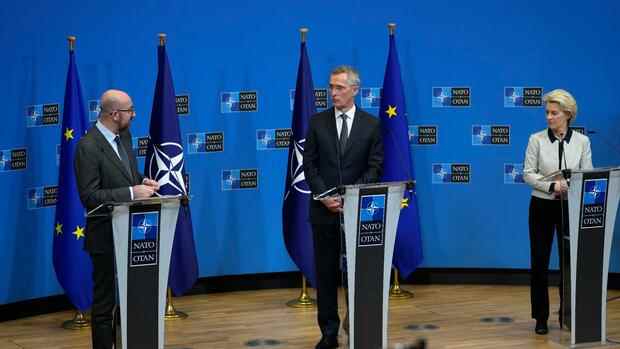NATO is prepared for anything in the Russia-Ukraine conflict.
(Photo: AP)
Brussels, Berlin “Putin will not win this war,” proclaimed Chancellor Olaf Scholz. An almost bizarre-sounding statement, given the speed with which Russian troops are penetrating Ukraine’s defenses. The Ukrainian armed forces have little to counter the Russian superiority. But if you broaden your horizons and look at all of Europe, Scholz is right. Putin’s stated strategic goal was to force the Americans to withdraw NATO troops from Eastern Europe.
The opposite of this is now happening. NATO strengthens its eastern flank and activates its defense plans. The US is sending more troops to Europe. 7,000 additional US soldiers are expected to arrive in Germany in the next few days. Maybe there will be more. Putin has breathed new life into NATO, which found itself in a crisis of identity after the humiliating withdrawal from Afghanistan. The alliance partners are more united than ever before in the face of Russian aggression against a neighboring country that is far inferior militarily.
The heads of state and government of the 30 NATO members want to meet for a virtual summit on Friday afternoon. US President Joe Biden has already prepared the partners for the new threat situation. “He has much bigger ambitions than Ukraine,” Biden said of the Russian ruler. “He wants to restore the former Soviet Union.” This could also put the Baltic states in Putin’s crosshairs. Lithuania declared a state of emergency on Thursday, allowing for more flexible use of state reserves and increased border protection.
The emotional speech that Valdis Dombrovskis, the Latvian Vice President of the EU Commission, gave in Paris on Thursday shows how great the concerns in the Baltic States are. “Russia poses a real threat to the free world. It is becoming a pariah state,” said Dombrovskis, who is not known for outbursts of emotion. “We must not be naive. We need to reconsider our relations with Russia in all areas.”
Top jobs of the day
Find the best jobs now and
be notified by email.
The Americans are preparing to do just that. The focus of the considerations is the NATO-Russia Founding Act, the treaty concluded in 1997 on the eastward expansion of the alliance, which limits the stationing of western troops in Eastern Europe and in return obliges Moscow to cooperate peacefully with its neighbors. “Given the current situation, we have to ask ourselves whether we should continue to abide by a treaty that the Russians are breaking,” said US Ambassador to NATO Julianne Smith, a close confidant of President Biden.
>> Also read: All current developments on the Ukraine conflict in the live blog
Europe is heading for a new Cold War.
According to a professor at the Bundeswehr University in Munich, the Kremlin “de facto” canceled the NATO-Russia Founding Act in 2014 – with the annexation of the Crimean Peninsula. “Now it is up to NATO to bury this document and to implement the freedom of action it has given us. This means, for example, the permanent stationing of substantial combat units in the new member states.”
If that happens, NATO combat troops and Russian military units could soon face each other again, this time not in Germany but on the border between Poland and Belarus, which Putin has already demoted to a satellite state. Europe is heading for a new Cold War.
Russia’s war of aggression is shifting the security architecture at breathtaking speed. With Finland and Sweden, two countries are also taking part in the virtual NATO summit that are not part of the alliance, but are now moving closer to it. It is about demonstrating the unity of the alliance and the close partnership with the two Scandinavian countries, stresses NATO Secretary General Jens Stoltenberg.
Even Germany, which savored the peace dividend after the collapse of the Soviet Union like hardly any other country, is rethinking national and alliance defense. “We have to get used to the fact that our armed forces have been managed for many, many years for wear and tear,” Finance Minister Christian Lindner said in a television interview on Thursday evening. Declining defense spending “no longer fits in with the times”.
The Americans have been trying to convince the Germans of this for years. They insist that the NATO partners gradually increase their defense budget to two percent of economic output and take on more of the burden in the alliance. Putin may win the war against Ukraine. But he is only making NATO, which he has declared his main opponent, even stronger.
More: Putin’s war: That’s what the President is aiming for by attacking the free world
